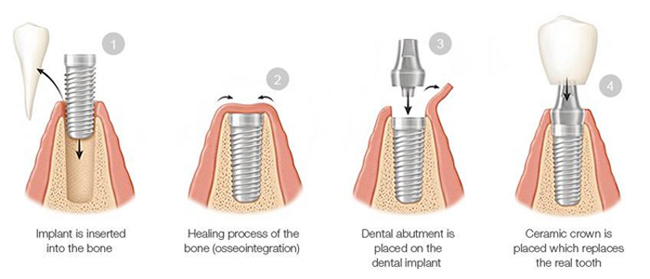Dental implants are the most effective way to replace missing teeth. Implant crowns and dentures from Beverly Hills cosmetic dentist Dr. LeSage look so real that people won’t be able to distinguish them from your natural teeth.
What Are Dental Implants?
Dental implants are artificial tooth roots. They mimic the anatomy of a natural tooth and include a root form, abutment, and dental crown.
- Root form – An implant fixture, or “root,” is usually made of titanium. It is surgically placed below your gumline.
- Abutment – An abutment is a connector that is attached to the top of an implant to support a dental crown.
- Dental crown – A dental crown, sometimes referred to as a “cap,” is used to replace the visible white portion of a missing tooth.
Implant overdentures
If all of your teeth are missing, dental implants can be used to support a full arch of teeth. You can receive two to six implants to anchor each denture, and the stability increases with the number of implants that are placed.
Why Are They So Effective?
Dental implants feel and function like natural teeth more than any other type of tooth replacement. And they outlast the alternatives—often lasting a lifetime.
- Secure anchor – Dr. LeSage works closely with a surgeon for your implant placement. The surgeon will review your medical and dental histories and take 3-D x-ray images (cone beam CT scan) to determine if you have enough bone to support your implants or if grafting is needed. The images also help identify the optimal position for proper function and healing. In three to four months, your jawbone and the root form will fuse together. The solid anchor is like a natural tooth root that stimulates your bone and prevents shrinkage and facial sagging.
- Lifelike crowns – You will receive precisely fitting crowns that blend with your natural teeth. They will match the shade, shape, translucency, and gloss of your own teeth and will be difficult to tell from real teeth.
- Stable and natural-looking dentures – Cosmetic dentures look natural. Before your denture is made, Dr. LeSage will listen to your preferences for tooth shape, size, and color and the image you want to project with your appearance. He will also analyze your oral anatomy and bite to ensure your dentures are comfortable and make it easy for you to eat and speak. And then he will design the denture to give you a beautiful smile that fits your personality, facial features, and preferences. It will feel like you have your own natural teeth back. You won’t have to worry about your overdentures lifting up, slipping around, or falling out of your mouth. And your dentures will be made with the highest-quality materials.
Are Dental Implants Painful?
During dental implant placement, an oral surgeon or periodontist will prevent you from feeling pain. Your mouth will be numb throughout the process. And the implant surgeon will perform the surgery using sedation or anesthesia.
What Can You Expect After Implant Surgery?
After dental implant surgery, as with any oral surgery, you can expect some discomfort. Most patients experience minimal, temporary discomfort. During the first few days after implant surgery, you can expect the following:
- Mild swelling
- Slight bruising
- Mild pain at the surgical sites
- Minor bleeding
What Can You Eat After Implant Surgery?
Immediately after dental implant surgery, you will have a liquid diet. But in the days and weeks to follow, you can progress with a soft-food diet. Avoid hard, sticky, or crunchy foods because they can dislodge blood clots or get stuck in the surgical sites.
How to Care for Your Implants
Single implants
After your dental implants are placed, you’ll have checkup appointments to ensure they are healing well. After the healing period, they need the same daily care as your natural teeth to prevent a buildup of food and bacteria around them. Floss around your implants, brush them, and keep your appointments for dental cleanings and exams.
Implant overdentures
Regular toothpaste and a regular toothbrush are too abrasive for denture teeth and can scratch them. Use a denture brush or an extra-soft toothbrush, along with denture paste.
Removable implant overdenture – If your denture snaps or clips onto dental implants, you should remove it and brush it nightly. Rinse it well, and soak it overnight in a denture cleaning solution. Gently but thoroughly brush your gums and the implant abutments to remove bacteria and prevent plaque accumulation.
Fixed implant overdenture – Fixed implant dentures are secured by screws. Brush your denture daily to keep it clean. You may find it helpful to use a Waterpik or other water flosser to clean beneath the prosthesis.
Read our implant overdentures page for details about the treatment.
If you’re interested in dental implants, call us to schedule an appointment, or request an appointment online.



